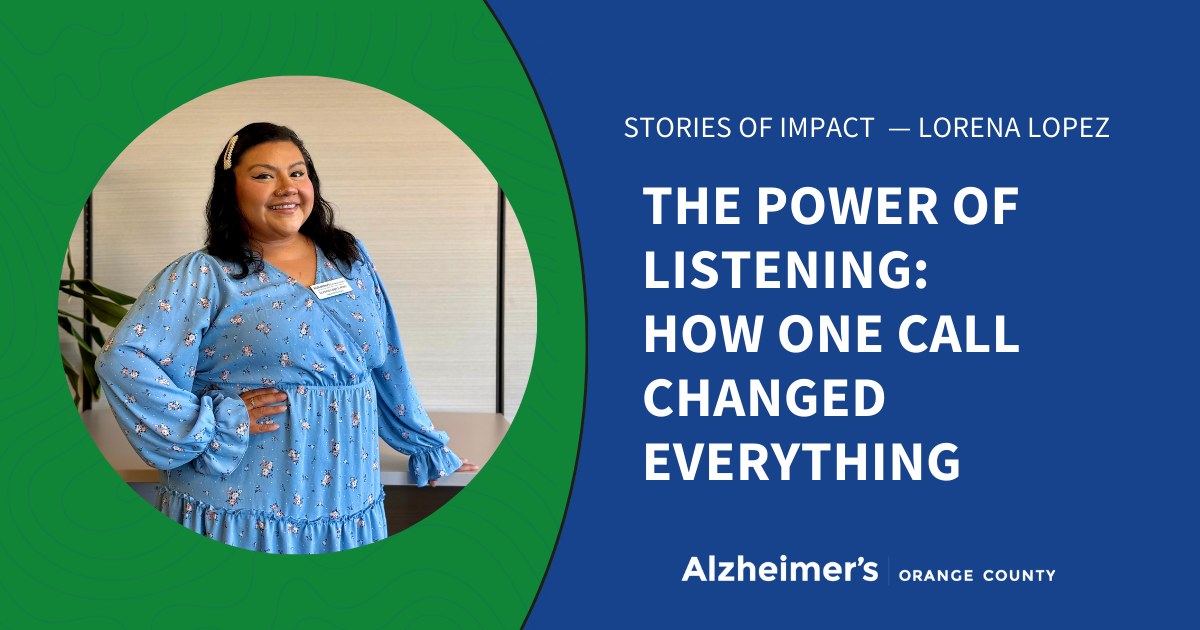When Lorena answered one of her first calls as a staff member on Alzheimer’s Orange County’s helpline, she didn’t know it would be one she’d never forget.
Lorena had only recently joined the organization as a full-time Lead Care Manager for the Enhanced Care Management Program, but her connection to Alzheimer’s Orange County began much earlier. During her one-year graduate internship for her Master’s in Social Work, , she built a strong foundation of experience that now enhances her work in this role.
Not long after starting at Alzheimer’s Orange County, she connected with a woman struggling to care for her mother, who had recently been diagnosed with Alzheimer’s. The woman requested a Spanish speaker, and what followed was a long, emotional conversation. Her mother’s behavioral symptoms were worsening, and she didn’t know where to turn. Lorena listened closely, offering compassion, resources, and reassurance. Before they hung up, she reminded the caller that she could reach out again if anything changed.
Three months later, the woman did just that, only this time, she asked for Lorena by name.
“Ever since that first phone call she has been vocal about how grateful she is to me as her lead care manager and the agency as a whole” Lorena recalls.
That second call wasn’t just a follow-up, it was the next step in her caregiving journey. Lorena recognized that the woman and her mother could benefit from more long-term support. She introduced her to the Alzheimer’s Orange County Enhanced Care Management (ECM) program, and soon, the woman was enrolled as a client under Lorena’s caseload.
Thanks to the information and resources she received through ECM, she no longer feels alone, and that has made a meaningful impact on how she shows up for her mother and for herself. Since then, Lorena has continued to support her through her caregiving journey.
“I’ve been able to support her with resources like caregiver guides, community resources, behavioral tools for dementia-related challenges, coordination of care, and culturally sensitive referrals, all in Spanish.”
Lorena credits the deep trust built in their initial conversation to the ability to connect in the caller’s native language. She explains that speaking Spanish allowed her to create a space where the woman felt safe to be fully herself.
“By providing a brave space in her own language, I was able to build rapport, which gave her the confidence to be her authentic self,” Lorena says. “There was an instant connection, and that ultimately led to trust.”
She also sees language as a direct bridge to trust in situations like this. While interpreters can help convey words, Lorena believes they can’t always capture the emotion someone is trying to express.
“When someone feels seen and heard in their language, it communicates that they matter,” she reflects.
Lorena’s ability to offer culturally and linguistically appropriate care wasn’t just helpful, it was transformative. It was a powerful reminder that sometimes, the help someone needs begins with a single conversation. While some callers may only need support once, many times, that first call becomes the start of an ongoing connection. One that opens the door to deeper support, vital resources, and long-term care. In moments like these, the true impact of Alzheimer’s Orange County comes into focus, not just as a provider of services, but as a lifeline, rooted in empathy, cultural understanding, and unwavering support for every family.
Need support? Call our helpline at 844-373-4400 to talk to someone today.


